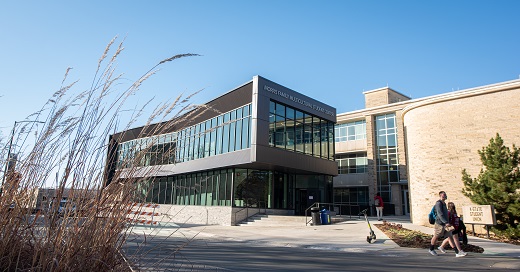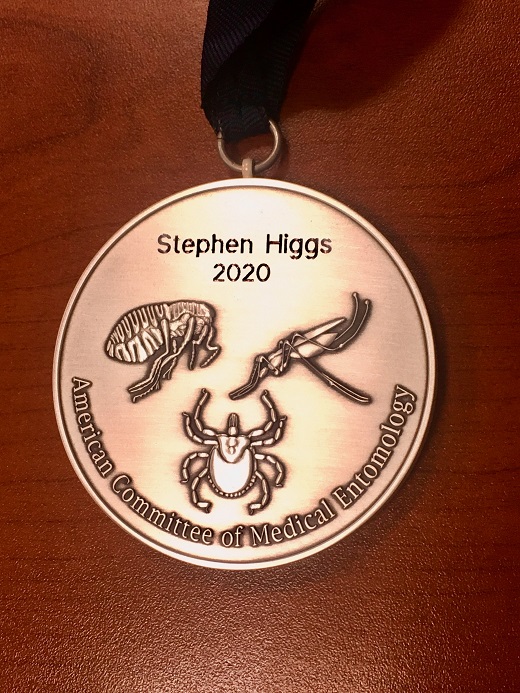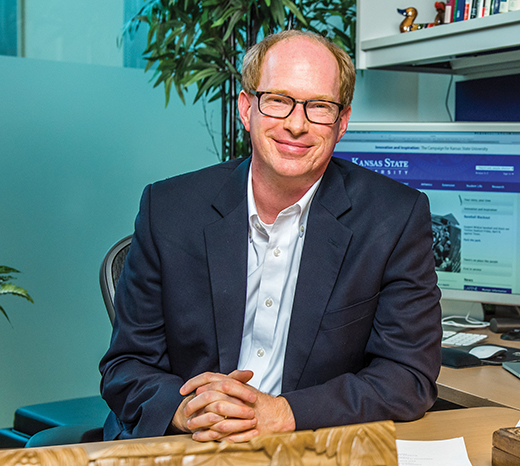12/09/20
K-State Current - December 9, 2020
K-State Current is a weekly news update for the Kansas Board of Regents to apprise the Regents on a few of the many successes and achievements made by K-State faculty, staff and students.
K-State News
K-State, KU Med to launch diabetes education project
 Kansas State University and the University of Kansas Medical Center are joining forces to determine the most efficient ways to provide education to the state’s residents for preventing diabetes.
Kansas State University and the University of Kansas Medical Center are joining forces to determine the most efficient ways to provide education to the state’s residents for preventing diabetes.
The two groups are planning to launch a six-month pilot project in Lyon County and the Central Kansas Extension District to implement the National Diabetes Prevention Program in rural locations in Kansas. The project is funded by a grant from the National Institutes of Health.
Depending on what they find, the program could then be launched throughout Kansas via the state’s extension network.
The NDPP was created in 2010 to address an increasing incidence of pre-diabetes and Type 2 diabetes in the United States. A key element is an approach recognized by the U.S. Centers for Disease Control and Prevention to make lifestyle changes – such as eating more healthfully and exercising more frequently.
The CDC’s research indicates that people who make the recommended lifestyle changes cut their risk of developing Type 2 diabetes by 58% – and 71% for people over 60 years old.
“We know there is a concerning prevalence of pre-diabetes across Kansas, including rural and urban areas, and among younger and older people,” said Sandy Procter, a nutrition and health specialist with K-State Research and Extension.
Listen to an interview by Jeff Wichman with Sandy Procter on the weekly radio program, Sound Living
Procter and Gayle Price, a professor and extension specialist in K-State’s southeast regional extension office, are leading the university’s work on this project.
A majority of adults who are diagnosed with diabetes – an estimated 90% to 95% – have Type 2 diabetes, which occurs when cells in the body become resistant to the effects of insulin. Unlike Type 1, which occurs when the body cannot produce insulin, the onset of Type 2 diabetes can be prevented.
The lifestyle changes most commonly recommended for lowering one’s risk of Type 2 diabetes center around weight, physical activity, stress, sleep and the type of food and beverages people choose.
The pilot program, Procter said, “also addresses food because we know diet is an important part of maintaining a healthy weight, as well as diabetes control and prevention. But it reaches beyond food to address lifestyle factors.”
For more than a decade, K-State Research and Extension has offered the national extension program, Dining With Diabetes, throughout Kansas. Dining with Diabetes focuses on individuals with Type 2 diabetes and/or their family members and caregivers, Price said. The grant from NIH and the partnership with the University of Kansas Medical Center will help the state’s extension agents broaden programming to those who have not yet been diagnosed with diabetes.
“I think KU Med recognized that K-State Research and Extension provides a great opportunity with agent educators located across the state, so we provide an effective avenue to get this very focused program out to people who are at risk,” Procter said.
“For health’s sake, it really is key for people to have the knowledge that they can change behaviors now to prevent this really costly disease.”
Procter said extension agents Emily Prouse (Lyon County) and Leah Robinson (Central Kansas District) are helping to lead the pilot programs in their communities.
If the pilot project is successful – and pending future grant opportunities – K-State Research and Extension and the KU Medical Center will make plans to offer a full year program throughout Kansas, including six months of directed lessons, and six months of “maintenance and check-in,” according to Procter.
“Because this program is offered as more of a lifestyle-coaching intervention, it can really help someone understand how they can control situations that sometimes lead to over-eating or sedentary behavior or other activities that may make them prone to diabetes. It’s a way to help participants take control and prevent the onset of diabetes as they go into their future.”
More information on K-State Research and Extension’s efforts to address diabetes in Kansas is available online.
K-State Faculty Highlights
Shireen Roshanravan recognized as Professor of the Week honoree

Shireen Roshanravan, associate professor of American ethnic studies in the College of Arts and Sciences, was recognized as Professor of the Week at the Dec. 5 men's home basketball game.
Roshanravan joined K-State in 2007. Roshanravan's important courses in American ethnic studies — such as Racist Love: Asian Americans and the Model-Minority Myth, Islamophobia, Transformative Thought, Intro to Cultural Competence, Politics of Women of Color, Research Methods, etc. — often center on decolonial and intersectional methodologies. Roshanravan teaches the Asian American studies courses in American ethnic studies, which are of vital importance as K-State works to deliver on its pedagogical commitments to teaching students about the diverse cultures and ethnicities that make up our state and our nation. On average, Roshanravan has advised about 18 American ethnic studies minors and/or majors annually. She has mentored students through the Developing Scholars Program and served on master’s thesis committees for grad students outside American ethnic studies. Roshanravan won the 2020 College of Arts and Sciences Davids-Dunham Professional Development Award and 2018-19 Big 12 Faculty Fellowship Award.
Stephen Higgs receives prestigious international award for achievements in medical entomology
 Stephen Higgs, Kansas State University associate vice president for research and director of the Biosecurity Research Institute, is the 2020 recipient of the Harry Hoogstraal Medal for Outstanding Achievement in Medical Entomology.
Stephen Higgs, Kansas State University associate vice president for research and director of the Biosecurity Research Institute, is the 2020 recipient of the Harry Hoogstraal Medal for Outstanding Achievement in Medical Entomology.
The medal is an international award from the American Society of Tropical Medicine and Hygiene, or ASTMH, and honors outstanding lifelong service to medical entomology. The American Committee of Medical Entomology, or ACME, virtually presented Higgs with the award at the ASTMH annual meeting this week.
“One of the reasons that I am thrilled to receive the Hoogstraal Medal is that it is awarded by one’s peers,” Higgs said. “In my previous roles with ACME, I have presented this award to many of the recipients. This is a career award that reflects the work of many students and collaborators from around the world.”
Higgs is the first representative from K-State to receive the Hoogstraal Medal. At K-State, Higgs has directed multidisciplinary research that encompasses many aspects of vector-borne viruses, with a particular focus on mosquito-virus-vertebrate interactions. He has published with more than 650 co-authors.
“Dr. Higgs is a true international collaborator and leader who has made significant contributions to K-State’s visionary goal of becoming a Top 50 public research institution,” said Peter Dorhout, vice president for research. “His impressive body of work shows why he is deserving of this award, and we are proud to have him at K-State.”
 Under Higgs’ leadership, the K-State Biosecurity Research Institute in Pat Roberts Hall has grown into a world-renowned biosafety level-3 facility that houses important multidisciplinary research, training and educational programs on pathogens that affect animals, plants and insects, as well as food safety and security. Higgs is an elected fellow of the American Society of Tropical Medicine and Hygiene and serves as the editor-in-chief of the journal Vector Borne and Zoonotic Diseases.
Under Higgs’ leadership, the K-State Biosecurity Research Institute in Pat Roberts Hall has grown into a world-renowned biosafety level-3 facility that houses important multidisciplinary research, training and educational programs on pathogens that affect animals, plants and insects, as well as food safety and security. Higgs is an elected fellow of the American Society of Tropical Medicine and Hygiene and serves as the editor-in-chief of the journal Vector Borne and Zoonotic Diseases.
The prestigious Hoogstraal Medal is named after American entomologist and parasitologist Harry Hoogstraal, who lived from 1917 to 1986, and is recognized as one of the world’s foremost authorities on tick-borne diseases. The Hoogstraal Medal has included notable recipients such as Willy Burgdorfer, who discovered Lyme disease.
Engineering professors receive Department of Defense grant for work on safety-critical systems
 Two Kansas State University professors of computer science have been awarded just over $400,000 for two years by the U.S. Department of Defense — Army for development of techniques in building safety-critical systems used in military operations.
Two Kansas State University professors of computer science have been awarded just over $400,000 for two years by the U.S. Department of Defense — Army for development of techniques in building safety-critical systems used in military operations.
The project, "Grand Unified Modeling of Behavioral Operators (GUMBO) SBIR Phase 2" funded under the Adventium Enterprises LLC program, will be led by John Hatcliff, university distinguished professor and Lucas-Rathbone professor in engineering, with co-investigator, Robby, professor and Don and Linda Glaser — Carl and Mary Ice Keystone research scholar.
"The behavior description notation is easy for developers to use and understand, but is based on advanced logics that can be automatically processed by computer verification tools," Hatcliff said. "When components obtained from different suppliers are integrated into a system, these verification tools can prove that important behaviors of each component work correctly with those of other components and that key functionality of the overall system is achieved."
This behavior specification and verification framework incorporates the Architecture Analysis and Design Language — a modeling language incorporated into multiple uses by the Army, including its Future Vertical Lift program. Future Vertical Lift, a plan to develop a family of military helicopters for the U.S. Armed Forces, involves sharing common hardware such as sensors, avionics, engines and countermeasures for five different sizes of aircraft under development.
"Results of our work will help engineers building critical systems more precisely understand behaviors of system components and will enable them to detect and fix system integration problems earlier in the system development process," Hatcliff said. "The developed framework will also aid the defense industry in adopting approaches to build critical systems from reusable components and platforms.
"The award further strengthens relationships between the Carl R. Ice College of Engineering and companies working on defense industry research programs," he said. "Moreover, it provides an opportunity to showcase K-State engineering faculty, students and research results in long-term programs building next-generation military capabilities."
K-State Student News
Personal financial planning students take second in national competition
 Three personal financial planning students took second place during the annual Association for Financial Counseling and Planning Education, AFCPE, Knowledge Bowl which was held during the annual Research and Training Symposium held November 16-20.
Three personal financial planning students took second place during the annual Association for Financial Counseling and Planning Education, AFCPE, Knowledge Bowl which was held during the annual Research and Training Symposium held November 16-20.
Three seniors, Carson Cox, Hutchinson, Luke Hannah, Wamego, and Matt Schlossman, Topeka, made up the 2020 team. The team applied for the competition in spring 2020 through a video submission application on why financial counseling is important today. They were selected as finalists along with Texas Tech University, University of Georgia, University of Missouri, Utah State University and Utah Valley University. This is the seventh consecutive year K-State has been selected to participate in the competition.
"We are so proud of Carson, Luke, and Matt and thankful for all the hard work they put into this competition,” said Martin Seay, department head. “Despite being unable to meet and study regularly in-person, they made K-State proud on the national stage."
The Knowledge Bowl is comprised of 50 multiple choice questions that focus on the Accredited Financial Counselor (AFC®) accreditation core competencies.
Along with the competition team, 23 other personal financial students from the undergraduate and graduate programs, including K-State Online students, were also in attendance for the virtual conference thanks to the AFCPE® Strategic Fund Student Scholarships.
The Association for Financial Counseling and Planning Education is the nationally recognized leader in financial counseling, coaching and education. Bringing together research, education and practice, they support the profession through comprehensive training, professional development and high-quality resources to help improve the economic well-being of individuals and families worldwide.
The Department of Personal Financial Planning at K-State strives to be world known for its research, education, service, and outreach in financial planning offering emphases in financial counseling and financial therapy. It has been consistently ranked as one of the top five undergraduate programs in the country. The department offers a bachelor’s, master’s and doctoral degree along with several professional certificates both on campus and online.